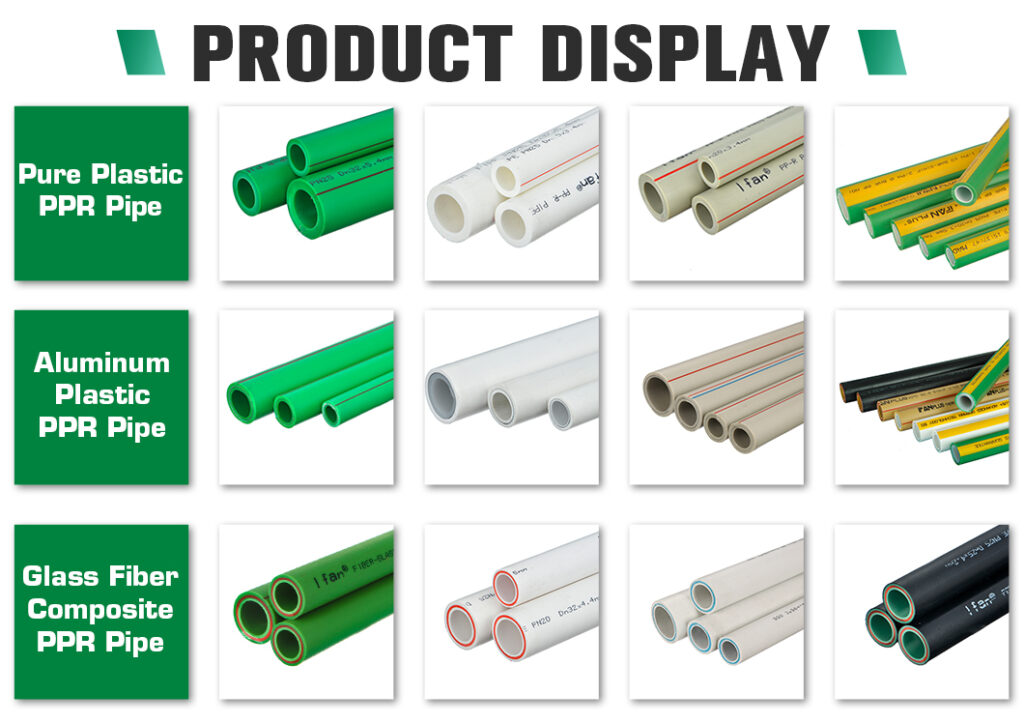In the dynamic landscape of the plumbing industry, materials and technologies are continually advancing to meet the demands of modern construction. One material that has garnered significant attention and acclaim is PPR (Polypropylene Random Copolymer) pipes. In this article, we will explore the extensive and diverse applications of PPR pipes within the plumbing industry.The Ubiquitous Application Of PPR Pipes In The Plumbing Industry.IFAN factory 30+ years manufacture experience support color/size customization support free sample.Welcome to consult for catalog and free samples.This is our FacebookWebsite: www.facebook.com
PPR Pipes: A Brief Introduction
PPR pipes are a type of plastic piping system made from polypropylene random copolymer. They are a versatile and innovative solution used for both hot and cold water distribution. The widespread adoption of PPR pipes is attributed to their exceptional properties and advantages.
Key Advantages of PPR Pipes
1. Corrosion Resistance
PPR pipes are highly resistant to corrosion, setting them apart from traditional metal pipes. This property ensures the purity and safety of water transported through these pipes.
2. Easy Installation
The installation process for PPR pipes is notably straightforward. Their lightweight construction and the heat fusion method used to join segments result in reduced labor costs and swift installations, making them a preferred choice for many plumbing projects.
3. Leak-Proof Joints
The heat fusion technique employed for connecting PPR pipe segments creates robust, leak-proof joints. This feature is vital for maintaining the integrity of the plumbing system, preventing water wastage, and averting structural damage.
4. Thermal Insulation
PPR pipes offer excellent thermal insulation properties. They help maintain the temperature of the water being transported, reducing the energy required to keep water hot or cold, thereby contributing to energy efficiency.
5. Noise Reduction
Flowing water in PPR pipes generates minimal noise, making them a valuable choice in residential and commercial buildings where a quiet environment is essential.
6. Hygienic and Safe
PPR pipes are non-toxic and safe for conveying potable water. They do not leach harmful substances into the water, ensuring the safety and health of the occupants in a building.
7. Longevity
PPR pipes are known for their impressive longevity. They exhibit high resistance to scaling, corrosion, and chemical agents, guaranteeing a durable plumbing system with minimal maintenance requirements.
8. Versatility
PPR pipes are versatile and find applications in various settings, including plumbing, radiant heating systems, air compression lines, and industrial processes. This versatility streamlines construction processes by offering a single solution for multiple requirements.

Diverse Applications of PPR Pipes
Residential Plumbing: PPR pipes are extensively used in residential buildings for both cold and hot water supply lines. Their ease of installation and reliability make them a favored choice for homeowners and contractors.
Commercial and Industrial Buildings: PPR pipes are a popular selection for plumbing in commercial and industrial structures due to their ability to handle varying water temperatures, reduce noise, and provide a long-lasting solution for demanding applications.
Radiant Heating Systems: PPR pipes are ideal for radiant floor heating systems. Their thermal insulation properties help efficiently transfer heat to living spaces, contributing to energy savings.
Agriculture: In agriculture, PPR pipes are used for irrigation systems. Their resistance to chemicals and long lifespan make them a durable choice for transporting water in farming applications.
Chemical and Industrial Processes: PPR pipes find use in chemical and industrial processes where the conveyance of aggressive fluids is required. Their resistance to corrosion ensures the safety of the transported substances.
Greenhouses: PPR pipes are used in greenhouse applications for their ability to withstand harsh environmental conditions while providing a reliable water supply for plants.
Environmental Sustainability
In an era where sustainability is a priority, PPR pipes offer an eco-friendly solution. Their durability, corrosion resistance, and energy-efficient thermal properties result in reduced resource consumption and a minimized environmental footprint.
Conclusion
PPR pipes have risen to prominence within the plumbing industry due to their exceptional properties and advantages. Their resistance to corrosion, ease of installation, leak-proof joints, thermal insulation, low noise transmission, safety, longevity, and versatility make them a sought-after choice for modern construction projects. As the plumbing industry continues to evolve, PPR pipes are expected to play an increasingly significant role in shaping its future. Their combination of durability, efficiency, and environmental sustainability positions them as a preferred solution for plumbing needs in contemporary construction, reflecting their ubiquity and growing importance in the field.

